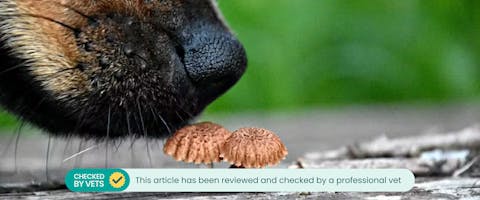Updated 11/05/2023
Packed with antioxidants and fiber, it’s no wonder mushrooms are so popular in the human world. Rising in popularity with the increase in veganism, more mushrooms are being chowed down on than ever. So with all of this hype, can dogs eat mushrooms like us humans or are mushrooms poisonous to dogs? Let’s get in the know below.
Trending posts
Purr-use some of the top blogs our members have been loving this month- Top male dog names for your new furry friendGot a new furry family member in your pack? Check…

- Top female dog names for your new fluffy palWelcoming a new pooch into your family? Explore…

- 120+ gray cat names your silver feline will loveRecently welcomed a fluffy gray bundle of joy into…

- What are normal pet sitting rates?Discover the average pet sitting rates for animals…

- Unique dog names to stand out from the packDare to be different with our list of the best…

Are mushrooms toxic to dogs?
The non-wild mushrooms you buy from your supermarket aren’t toxic to dogs, but that’s not to say they’re a necessary part of their diet. Pups are omnivores, and although mushrooms can provide some nutrients to canines, they are in no way a necessary addition to dog food. But, if you’d like your furry buddy to branch out and try the food you love, shop-bought mushrooms can be safe for them. We say can as you should be cautious when cooking your mushrooms - there are lots of ingredients us humans enjoy that are seriously bad for dogs (like garlic and onions). So, cook your pup’s mushrooms separately in a little olive oil or give them raw, avoiding the temptation to add salt or any other seasonings. Always give novel foods in small quantities only, to avoid a tummy upset.
Can dogs eat wild mushrooms?
No, it’s not safe for your pup to forage for wild mushrooms while you’re walking in the woods (or anywhere that fungi sprouts - including your garden!). While some believe that our canine friends can tell which mushrooms are toxic through their heightened sense of smell, this is unlikely, as mushroom toxicity is certainly seen in dogs. Even if this unlikely fact were true, there’s a chance your pup a) isn’t able to tell which mushrooms are safe at all, and b) they could still make a mistake even if they can sniff out a suspicious toadstool at times. And sadly, it only takes one mistake with wild mushrooms.
While you should make sure your pup’s avoiding wild mushrooms altogether, there are a few that are particularly dangerous. Here’s some to look out for:
- Death cap (Amanita phalloides) - this is responsible for the vast majority of mushroom poisoning cases
- Deadly Galerina (Galerina marginata)
- Jeweled deathcap (Amanita gemmata)
- Deadly Agaric (Amanita muscaria)
- False morel (Amanita muscaria)
- Inocybe sindonia
- Deadly webcap (Cortinarius rubellus)
- Destroying angel (Amanita virosa)
- Angel’s wings (Pleurocybella porrigens)
Identifying mushroom species can be extremely difficult, so it is recommended to seek veterinary attention if your dog eats a wild mushroom, whether or not you think it looks like one on this list.
Mushroom poisoning in dogs
Symptoms
Sadly due to the variety of toxins in some wild mushrooms, the effect they have on us and our pups varies with them. We’ll explore some of the symptoms to look out for below, but we’d always advise contacting your vet immediately if you think your pooch has managed to nab a wild mushroom - the effects can sometimes be fatal, so it’s always better to act fast.
- Vomiting
- Diarrhea
- Salivation
- Abdominal pain
- Weakness and lethargy
- Ataxia (wobbly, uncoordinated movements)
- Collapse, coma
- Seizures
Other symptoms your pup may be experiencing without you realizing include:
- Organ failure, including liver and kidneys
- Jaundice
- Altered heart rate and rhythm
Diagnosis
If you think your pup may have eaten a wild mushroom, it’s vital you contact your vet immediately. If you can, note the type of mushroom your pup ingested, take a photo of it, or carefully get a sample of it by wrapping a small amount in a damp paper towel, stored in a paper bag - just be sure to wash your hands thoroughly and try not to touch the mushroom itself. Getting a sample will help your vet choose the best treatment for your pup, which will also depend on the symptoms they’re experiencing.
Treatment
Treatment will vary depending on the type of mushroom your pup ingested and the symptoms they’re experiencing. If you manage to get to the vet quickly after your pup ate the wild mushroom, they may induce vomiting to remove the mushrooms from the stomach, or they may use activated charcoal to bind the harmful toxins before they enter the bloodstream. Supportive care usually involves an intravenous drip to flush toxins out of the body, support organ systems, maintain blood pressure and prevent dehydration. Medication such as anti-sickness drugs may also be needed, depending on your pet’s symptoms.
Meet our veterinary expert, Lizzie
This article has been checked by veterinarian Lizzie Youens BSc (Hons) BVSc MRCVS. Lizzie graduated from the University of Bristol in 2011, and has been working in first opinion companion animal practice. She has worked in a variety of clinics across the UK, from large hospitals to small branch practices. She enjoys doing a mixture of medicine, surgery and emergency work. Lizzie currently works in a small rural practice where she enjoys working in a close-knit community.
Other plants that are poisonous to dogs
Unfortunately, the world is filled with plants that are poisonous to dogs, so it’s best for pet parents and sitters alike to be aware of those to avoid. Here are a few to get you started:

